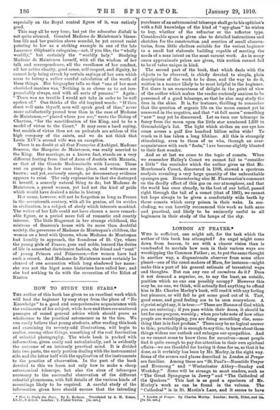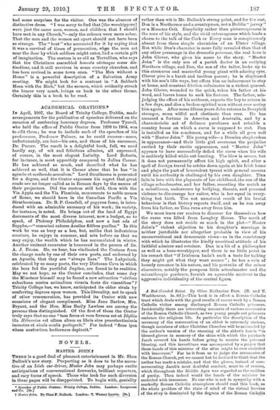LONDON AT PRAYER.*
Wrro is sufficient, one might ask, for the task which the author of this book has attempted ? An angel might come down from heaven, to see with a clearer vision than is vouchsafed to mortals how men in their various ways are worshipping the Common Father; or, to put the same thought in another way, a dispassionate observer from some other planet—one of the canal-makers of Mars, for instance—might make this a part of his general estimate of terrestrial ways and thoughts. But can any one of ourselves do it P Does it not demand a superior, or, to say the least, an outside, position which no one can possibly occupy P However this may be, no one, we think, will actually find anything to offend him in Mr. Charles Morley's book, will read it with any feeling but pleasure, or will fail to get some good out of it. Tact, good sense, and good feeling are to be seen everywhere. A ri,gorist might say, it is true:—" These are Houses of God which you are entering ; if you pass within their doors, it should he but for one purpose, worship ; when you take note of how other people are worshipping, you are doing something else, some- thing that is in fact profane." There may be no logical answer to this; practically it is enough to say this; to know about these things widens our outlook and enlarges our sympathies. And as we cannot come to know them for ourselves—most people find it quite enough to pay due attention to their own spiritual affairs—we are thankful for having it done for 11B, so that it be done, as it certainly has been by Mr. Morley, in the right way. Some of the scenes and places described in London at Prayer are familiar. Among these are "St. Paul's—Noontide Prayer and Evensong" and "Westminster Abbey—Sunday and Weekday." Some will be strange to most readers, such as "The Great Synagogue in Jewry" and "The Cathedral of the Quakers." This last is as good a specimen of Mr. Morley's work as can be found in the volume. The "Cathedral" is in St. Martin's Lane, and it seems to have
• London at Papier. By Charles Morley. London: Smith, Elder, and Co. [Ys. 6d. net.]
bad some surprises for the visitor. One was the absence of _distinctive dress. "I was sorry to find that [the worshippers) were just the same men, women, and children that I should have met in any Church,"—only the colours were more sober. That the men and the women sat apart should not have been so strange. The "host "who accounted for it by saying that it was a survival of times of persecution, wh,sn the men sat near the door by which soldiers might enter, had a certain gift of imagination. The custom is as old as Tertullian, who says that the Christians assembled honesta utriusque sezus dis- tinctions, and it still survives in some country churches, and has been revived in some town ones. "The Men without a Home" is a powerful description of a Salvation Army meeting. We might look for a contrast in "A Sabbath Morn with the Rich," but the sermon, which evidently struck the bearer very much, brings us back to the other theme. Certainly this is a book to be read.























































 Previous page
Previous page